Sushi Canapés are the simplest form of sushi, and they are a pretty finger food. Simply by putting your choice of sushi toppings on rolled rice, you can create a stunning crowd-pleaser. I can guarantee you that everyone will be very impressed with how pretty (and tasty, of course) they are.
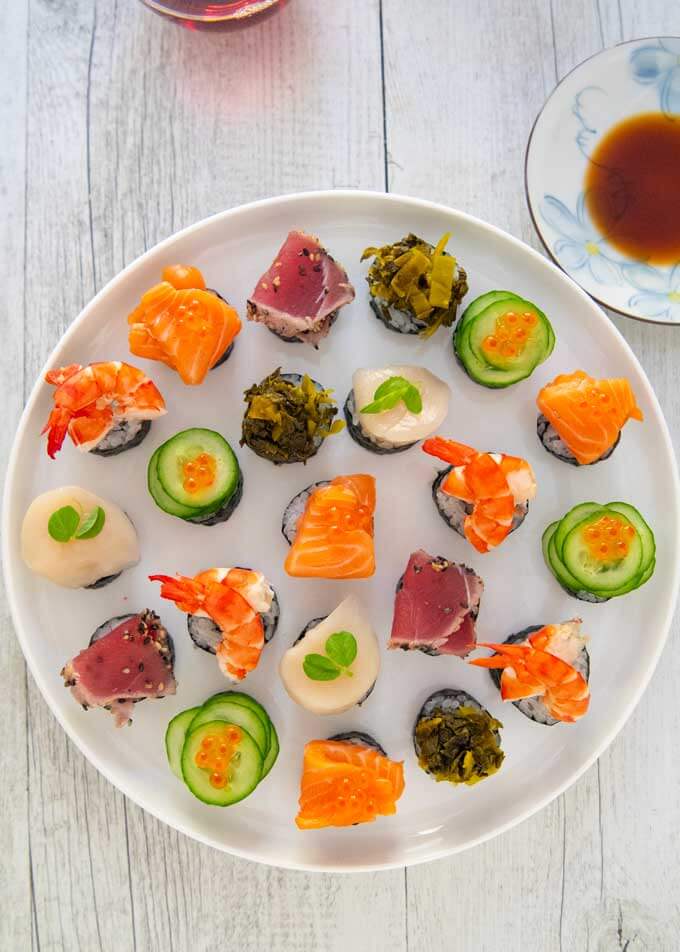
It is not very easy to make nigiri sushi properly. Similarly, you need to apply a bit of technique to make neat and tidy Sushi Rolls (Noroimaki) with the fillings in the centre. But you can easily make Sushi Canapés without any trouble at all.
The beauty of today’s Sushi Canapés is that it looks as if you went through so much trouble making them and beautifully plating them. But in fact it does not require much effort at all.
Rolling rice on nori sheets without fillings is easy. The sliced rice rolls don’t have to look neat because they will be covered by toppings.
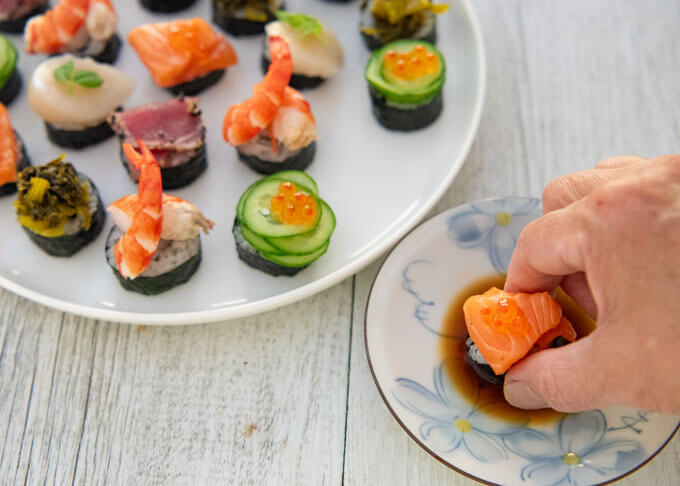
You will need a very small amount of topping per piece, and you can be creative with the kind of toppings you put on the rice. Anything that can go with sushi rice is fine for a topping to decorate this simple sushi. The combination of toppings is endless.
What’s in My Sushi Canapés
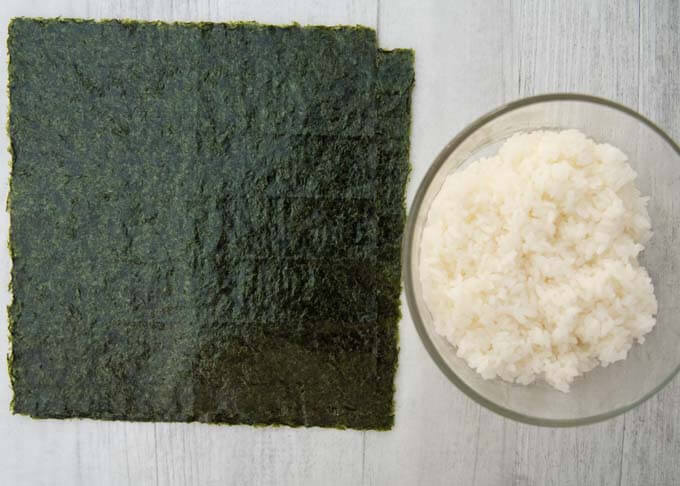
- Yakinori (roasted nori sheets)
- Sushi rice
Unlike my recipes Sushi Rolls (Noroimaki) and Take Away Sushi Rolls, you will use a full-size nori sheet to make the rolled rice.
For each roll of rice, I used about 150g/5.3oz of sushi rice. If you use more/less rice, you will make larger/smaller canapé bases.
Toppings
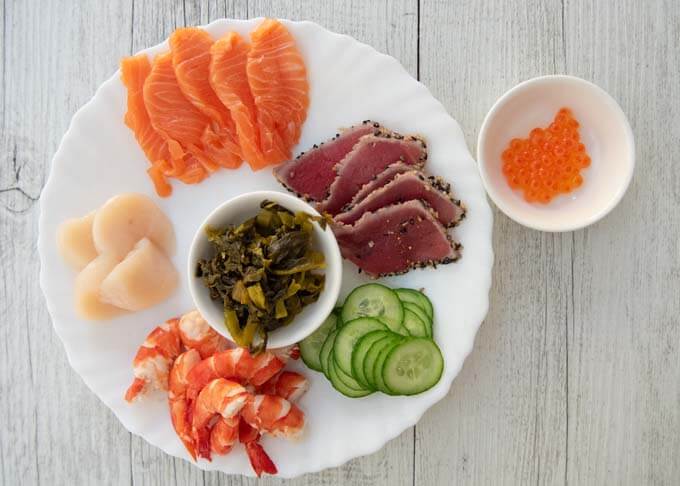
(From top clockwise)
- Salmon sashimi, thinly sliced
- Seared tuna sashimi, thinly sliced
- Thinly sliced cucumber
- Cooked prawns
- Scallop sashimi, halved horizontally
- Chopped takanazuke (in the middle)
Garnish
- Ikura (salmon roe)
- Leaves of sprout pea shoots for garnish (forgot to include in the photo, sorry)
I bought a small tray of salmon sashimi and seared tuna sashimi from the fish shop. I had frozen scallops that can be eaten raw after defrosting. My prawns were medium size, so I halved them.
Takanazuke (photo below) is the pickled Japanese mustard greens that I introduced to you in the post Fried Rice with Pickled Mustard Greens (Takana Chāhan).
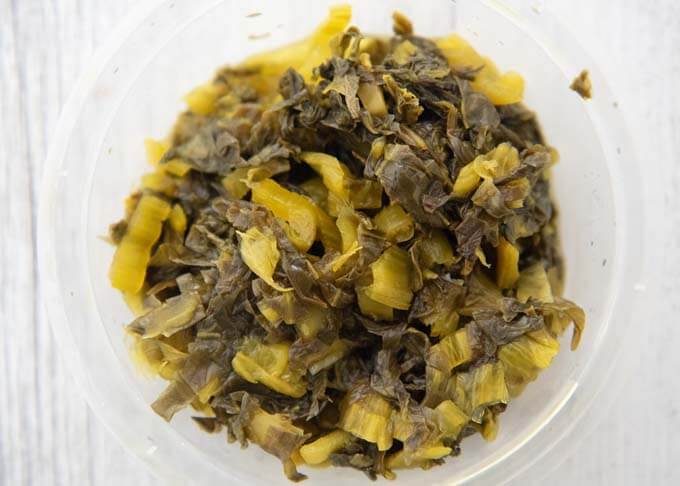
You don’t need to have all of them, and you can use other toppings. I listed other topping suggestions in the last section of this post. You might be interested in using some of those instead of the toppings above.
How to Make Sushi Canapés
Since you can make the rice rolls ahead of time, I divided the steps into two sections. See the video.
Rice Rolls
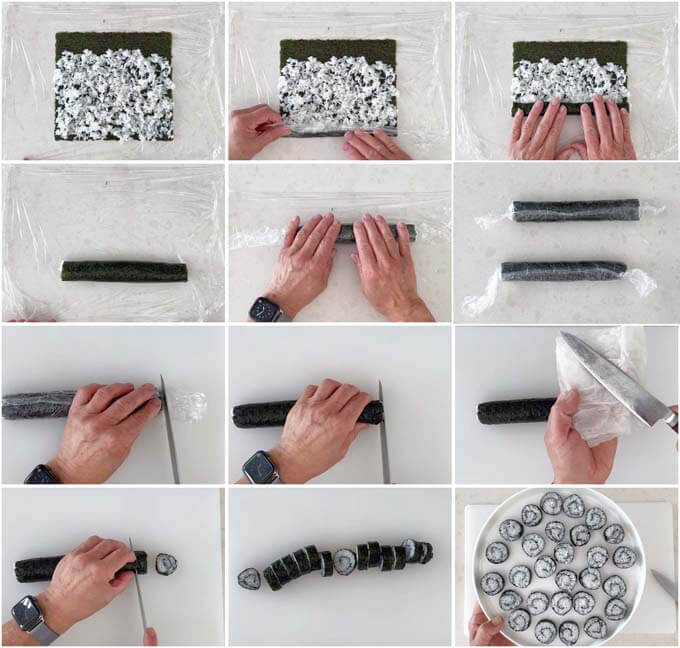
- Place a sheet of cling wrap on a workbench and place a nori sheet on it.
- Spread rice on a sheet of nori, leaving about 4cm/1½” border on the side furthest from you.
- Starting from the end of the nori sheet closest to you, roll the rice with nori tightly to the end.
- Wrap the rice roll in the cling wrap and twist both ends to secure the edges of the rice roll. Leave it for 5-10 minutes for the rice and nori to blend.
- Unwrap the cling wrap and slice the rice roll into thin discs.
- Place the rice pieces on a large serving plate, evenly spaced out.
As you can see in the photo above and the video, unlike standard sushi rolls, the rice is sparsely spread, so you don’t fill up your stomach.
You can make rice rolls 1 day earlier, although the rice becomes slightly hard. My recommendation is to leave the rice rolls in cling wrap without slicing, and keep them in the fridge.
Toppings
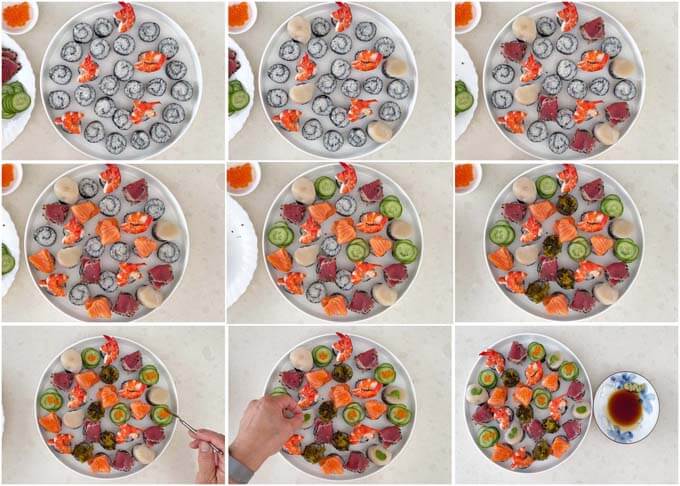
In no particular order until you put ikura on some of them.
- Place one set of prawns on each rice base. It looks better if you place the tail on top.
- Place one piece of scallop sashimi on each rice base.
- Place one piece of seared tuna on each rice base, folding the slice so that the tuna just covers the rice base.
- Place one piece of salmon on each rice base in the same way as the tuna.
- Place about 5 slices of cucumber on each rice base.
- Taking a small amount of takanazuke at a time, squeeze the liquid out of it, then make a small ball. Place it on each rice base.
- Put several ikura (salmon roe) on top of the salmon and cucumber. Put leaves of pea shoots on the scallops.
- Serve with soy sauce and wasabi to dip in.
I find it easier to put the same toppings on at once, scattering as evenly as possible. You can also cluster the same toppings together if you want, but I think scattering them looks stunning on a round plate. If the serving plate is square or rectangle, you can group the same toppings together and line them up neatly.
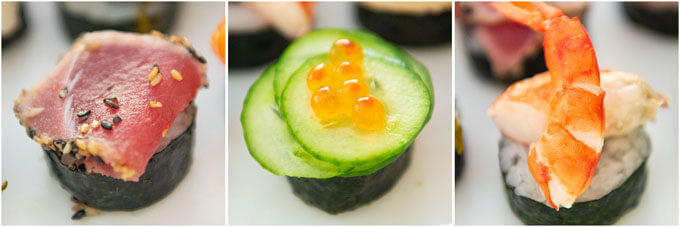
Additional Toppings and Combinations
As mentioned earlier, you can use almost anything that is used for nigiri sushi and sushi rolls. The following is not the complete list, but you may not have trouble getting these ingredients.
Toppings
- All sorts of sashimi slices, e.g., kingfish, tuna, snapper.
- Cured mackerel per my recipe Shime Saba.
- Kingfish Tataki (can be tuna, yellow tail/horse mackerel).
- Negi toro (minced tuna) as in my post Negi Toro Don.
- Smoked salmon.
- Teriyaki Chicken, cut into small pieces.
- Sautéed pork cut into small pieces.
- Grilled eel as in Unadon (Grilled Eel on Rice Bowl), cut into small pieces.
- Roast beef, cut into thin small pieces.
- Blanched asparagus, a few short sticks per serving.
- Avocado diced or sliced.
- Takuan (pickled daikon), julienned.
- Simmered Shiitake Mushrooms, whole if very small, or quartered.
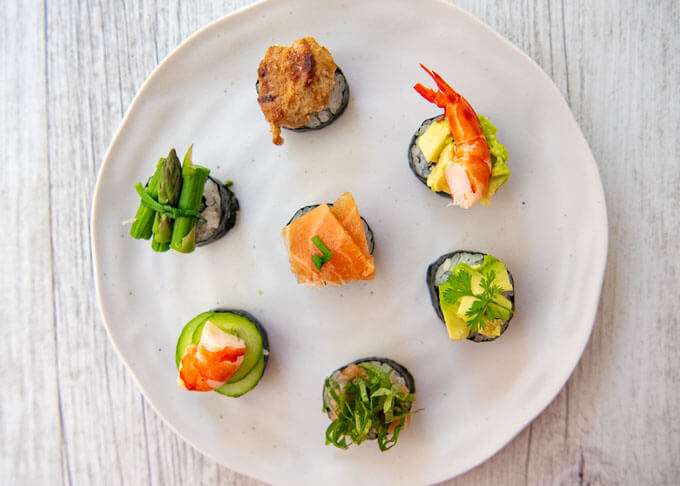
If using sashimi slices, you can either slice them thinner than standard sashimi and fold them to put on the rice roll or slice them thick and halve the pieces to make them square.
Topping combinations
You can also put two toppings together.
- Avocado and salmon/smoked salmon
- Cucumber and prawns/tuna/salmon
- Cream cheese and smoked salmon
- Canned tuna with avocado as in my post Take Away Sushi Rolls.
- Julienned perilla and umeboshi (pickled plum)
You may not be familiar with the combination of perilla leaves and umeboshi, but most traditional sushi shops make sushi rolls with them as fillings. It is a refreshing sushi piece.
Garnishes
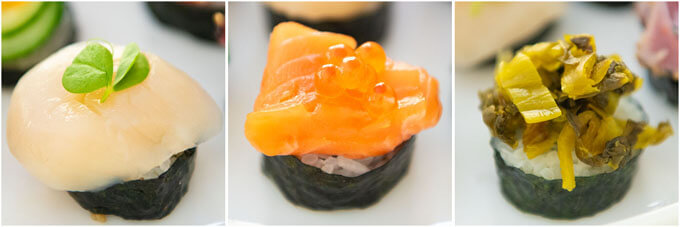
By adding a small garnish on top of the main topping, you can decorate the dish to be more colourful.
- Ikura (salmon roe)
- Tobiko (flying fish roe)
- Micro greens
- Sprout pea shoots (only the leaves)
- Sesame seeds (black and/or white)
I served Sushi Canapés on a couple of occasions recently. It certainly wowed people at one glance, then all the sushi pieces disappeared quickly. On both occasions, people asked if I made it myself. What a compliment!
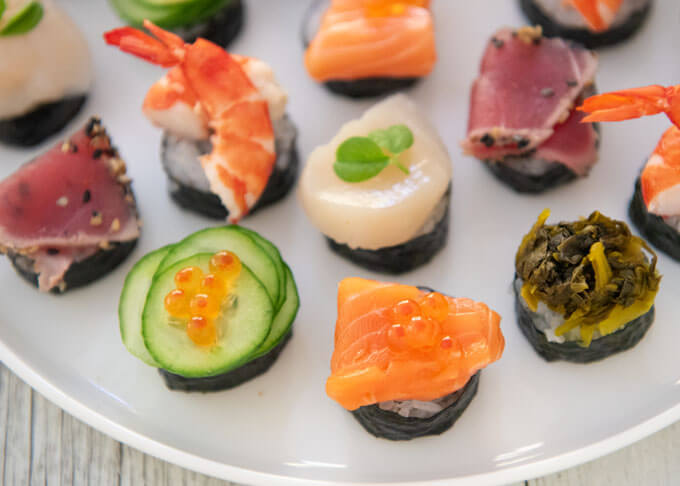
You might have struggled to make normal sushi rolls neatly since the filling needs to be in the centre of the roll with the right balance of rice and the filling. But Sushi Canapés are so easy to make with more tolerance for mistakes. Even if the rice rolls are slightly uneven, it doesn’t matter because the rice rolls are hidden beneath the toppings!
Sushi Canapés are a great finger food and perfect for upcoming festive gatherings.
Yumiko![]()
Watch How To Make It
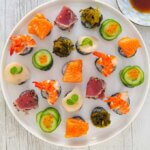
Sushi Canapés are the simplest form of sushi, and a pretty finger food. By simply putting your choice of sushi toppings on rolled rice, you can create a stunning crowd-pleaser. I can guarantee you that everyone will be very impressed with how pretty (and tasty, of course) they are.
The instructions are long with many notes, but it is actually very easy to make. See the video.
Total Time does not include time to cook rice and make sushi rice.
Don't forget to see the section 'MEAL IDEAS' below the recipe card! It gives you a list of dishes that I have already posted and this recipe that can make up a complete meal. I hope it is of help to you.
- 2 sheets yakinori (roasted seaweed, full size)
- 300g/0.7lb sushi rice (note 1)
- 5 prawns (medium, cooked and peeled)
- 5 slices salmon sashimi (note 2)
- 5 slices seared tuna (note 2)
- 2 scallops for sashimi (note 3)
- 25g/0.9oz thinly sliced cucumber (note 4)
- 2 tbsp takanazuke finely chopped (note 5)
- Ikura (salmon roe)
- Sprout pea shoots (leaves only)
-
Cut cling wrap into a square (should be larger than the nori sheet) and place it on a workbench, then place a sheet of yakinori on it in the centre, shiny side down. The longer side of the nori sheet should be horizontally placed.
-
Spread half of the sushi rice on the yakinori covering the entire sheet, leaving 4cm/1½" border on the side furthest from you (note 6).
-
Hold the edge of the cling wrap closer to you with both hands and lift the edge of the nori sheet with rice, then make a narrow fold along the side line. Firmly press down over the cling wrap (note 7).
-
Put the cling wrap back to where it was. Using both hands, start rolling the rice with nori from the folded edge, moving away from you until the end. Make sure that you roll the rice firmly but not too tightly.
-
Move the rice roll back close to you and wrap the rice roll with the cling wrap. Twist both ends of the cling wrap to secure the end of the rice roll and leave it for 5-10 minutes (note 8).
-
Repeat for the second rice roll.
-
Find the end of the cling wrap and fold it or mark it so that you will know where to start unwrapping the roll.
-
Cut the twisted part of the cling wrap on both ends of the roll (note 9), then remove the cling wrap.
-
Place the rice roll horizontally on a cutting board. Fold a couple pieces of wet kitchen paper (note 10).
-
Pat both ends of the rice roll with the side of a knife to flatten the ends and make them tidy.
-
Starting from one end of the roll, slice the roll into 1.5cm/⅝" thick discs. Every time before you slice the rice roll, wipe your knife with the wet kitchen paper and remove the rice glued on it.
-
You should get 14 discs if the thickness of your slices is exact, because the standard length of the nori sheet is 21cm/8¼" (note 11).
-
Place the rice pieces on a serving plate, evenly spaced out.
-
Cut the prawns in half in the middle. Place a set of two prawn pieces on each canapé base, with the tail on top.
-
Halve each scallop horizontally so that you get 4 thin round scallop pieces. Place a piece on each canapé base.
-
Place a piece of tuna on each canapé base and do the same for the salmon piece (note 12).
-
Take several cucumber slices per canapé base, randomly spread them to fit to the diameter of the canapé base, then put them on.
-
Taking ½ tablespoon of takanazuke per canapé base and squeeze it to get the liquid out. Make a ball shape and put it on the base. Press down to cover the surface of the canapé base.
-
Put several salmon roe on top of salmon and cucumber pieces.
-
Put leaves of pea shoots on scallops.
-
Serve with soy sauce and wasabi in a small plate to dip in.
1. Please refer to Temakizushi (Hand Rolled Sushi) for how to make sushi rice.
2. I bought a sashimi pack from Harris Farm Markets. They didn’t have tuna sashimi but had seared tuna instead.
3. I used sashimi quality frozen scallops by thawing them in a particular way to keep good flavours. You can find this thawing method in my post Scallop Terrine. My scallops were 3-3.5cm/1⅛-1⅜" in diameter and 2.5cm/1" thick.
4. I used a mandolin slicer to make 1.3mm thick slices. It doesn’t have to be the same thickness as my cucumber slices, as they will be piled up as a topping.
You just need an adequate amount of cucumbers per canapé. I think 5g per canapé is adequate, but you can put a bit more if you like.
5. Takanazuke is the pickled Japanese mustard greens that I introduced to you in the post Fried Rice with Pickled Mustard Greens (Takana Chāhan).
6. The rice will not cover the nori sheet completely. You will see black nori showing here and there, and that is quite alright.
7. I fold it over the cling wrap so that rice grains do not stick to your fingers.
8. Leaving the roll in the cling wrap allows the rice and nori to blend.
9. Trust me, it will be extremely difficult to remove the cling wrap without cutting both ends off.
10. Use wet kitchen papers to wipe your knife every time you cut the rice roll.
11. It doesn’t matter if you only get 13 or 12 discs. You might get 15 or 16 if your slice is a bit thinner, and that’s OK too.
12. Sashimi slices are usually in a rectangular shape. Fold them so that the sashimi piece nicely sits on the canapé base.
13. You can make the rice rolls ahead of time, although the rice becomes slightly hard. Complete the instructions for Making Rice Rolls and keep the rolls in the fridge.
Meal Ideas
A typical Japanese meal consists of a main dish, a couple of side dishes, a soup and rice. I try to come up with a combination of dishes with a variety of flavours, colours, textures, and make-ahead dishes.
Since Christmas is only one month away and Sushi Canapés is a perfect dish for it, I decided to pick some finger foods that are pretty and will impress your guests.
Strawberry Shortcake is a dessert, but it is a ‘must have’ cake for Christmas in Japan. So, I thought ‘why not?’.
- Finger food 1: Sushi Canapés – today’s recipe, you can make ahead for the canapé base.
- Finger food 2: Smoked Salmon Appetiser Bites Wrapped in Turnip – add ikura (salmon roe) to make it luxurious.
- Finger food 3: Pickled Chrysanthemum Radish – or other pickles.
- Finger food 4: Oysters with Tosazu Dressing 3 Ways – you can pick just one dressing if you prefer.
- Finger food 5: Scallop Terrine – make ahead.
- Dessert: Japanese Strawberry Sponge Cake (Strawberry Shortcake) – you can make a day earlier.
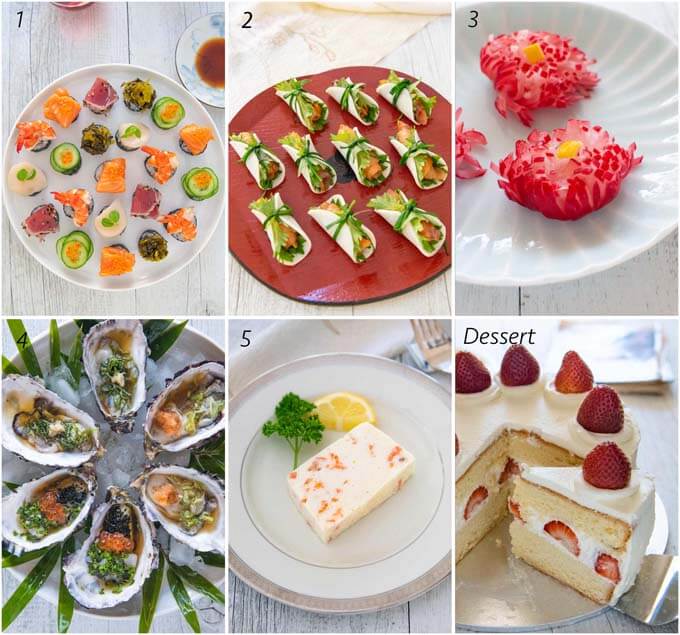
What a wonderful idea, and it looks stunning
Hi Goanna, it does look pretty, doesn’t it? Good news is that anyone can make it as stunning as that.
Simply love this idea❤️
Hi Poormina, thank you!